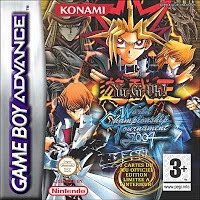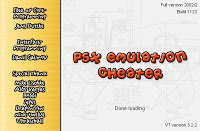 |
| Yu-Gi-Oh! Worldwide Edition: Stairway to the Destined Duel Review |
Kazuki Takahashi's Yu-Gi-Oh! franchise is one that seems tailor-made for merchandising opportunities, and especially for translation to the video game medium. A broad cast of wide-eyed young fighters, called duelists in the Yu-Gi-Oh! universe, play a collectible-card game called Duel Monsters in which the monsters represented on the cards actually manifest themselves in the real world. Yu-Gi-Oh! Worldwide Edition: Stairway to the Destined Duel essentially re-creates the Duel Monsters collectible-card game, allowing you to play it against many of the characters from the show or against your friends using a GBA link cable. This is a game designed specifically for Yu-Gi-Oh! enthusiasts, no question, and they'll be the people who get the most out of it. It can also serve as a decent primer on collectible-card games as a whole, since the mechanics are relatively straightforward.
The card game itself is virtually identical to the one seen in the Yu-Gi-Oh! cartoon.
Yu-Gi-Oh! Worldwide Edition: Stairway to the Destined Duel has more of a premise than an actual story. As an anonymous duelist, you're in Battle City, which is represented by a Final Fight-style map divided up into districts. Everyone loves a good fight in Battle City, so it's not hard to find other duelists to play against. Once you choose the duelist you wish to challenge, you'll be treated to a short bit of smack talk and then tossed into the game.
The card game itself is virtually identical to the one seen in the Yu-Gi-Oh! cartoon and the real-world Yu-Gi-Oh! collectible-card game, so fans should be instantly familiar with how to play. First-timers have a slightly steeper learning curve to deal with, especially if they're not already knowledgeable about the basics of collectible-card games. Most of the basics are elementary enough that you'll likely pick it up with a bit of trial and error, though the manual that comes with the game is dense with specific information about the subtler nuances of the Duel Monsters game.
Basically, you start off with a more or less random deck of cards consisting of monster cards, spell cards, trap cards, and special summon cards. The monster cards can be used to attack your opponent's monster cards, or if your opponent has no monster cards in play, to attack him or her directly, with the ultimate goal of taking all your opponent's hit points before he or she can do the same to you. Spell and trap cards serve a variety of different offensive and defensive purposes, such as upping the statistics of your monster cards, destroying one of your opponent's cards, counteracting your opponent's move, or fusing two monsters into a third, more powerful monster. Most monsters can be brought directly into play from your hand, though certain monsters require a summon card to be played before they can be brought into action.
You'll be rewarded with a handful of new cards when you best your opponents, and you'll also receive five free cards every "week" in the game from a duelist's lifestyle magazine that your character apparently subscribed to before the start of the game. When you're not actually dueling, you'll be spending the rest of your time in the game adjusting your deck using a fairly comprehensive and intuitive menu system. The basic strength of your cards factors heavily into whether or not you'll be victorious, though some smart strategy and a spot of luck can help you score a win against an opponent with a more powerful deck. Among the collectible-card-game crowd, Yu-Gi-Oh! isn't considered one of the most strategically complex games out there, and this comes across in its video game form as well. Once you've built up your deck to a respectable level and have a strong grasp of the mechanics, most of your losses will come from the weakness of your cards rather than your own skills.
The basic strength of your cards factors heavily into whether or not you'll be victorious.
Considering you're playing a video game simulation of a collectible-card game, the action in Yu-Gi-Oh! Worldwide Edition: Stairway to the Destined Duel is pretty abstract. The presentation doesn't do much to help bridge the gap between the two distinctly different mediums of video games and collectible-card games, though it arguably does better by the Yu-Gi-Oh! license than the recent Duelists of the Roses for the PlayStation 2. You'll be treated to clean-looking 2D character art of your opponent in between matches, and you'll catch flashes of the actual card art during the battle phase and the deck-building phase, but for the most part, you'll be looking at a playfield that emulates the layout of the real-world Yu-Gi-Oh! card game, which is just dull. The music is of the standard 16-bit synthesized variety, which is to say it's decent.
As far as video game representations of collectible-card games go, Yu-Gi-Oh! Worldwide Edition: Stairway to the Destined Duel is a serviceable, lightweight entry in the genre. It stays true enough to the source material, which should please fans, but the game's rather dry presentation may make it inaccessible to outsiders, and the fundamental mechanics of the card game may be too simplistic for collectible-card game enthusiasts who've moved on to deeper, more complex games.
Yu-Gi-Oh! Worldwide Edition: Stairway to the Destined Duel Review
DOWNLOAD
download emulator first !!
Game Boy Advance Emulator (Emulator)
DOWNLOAD















